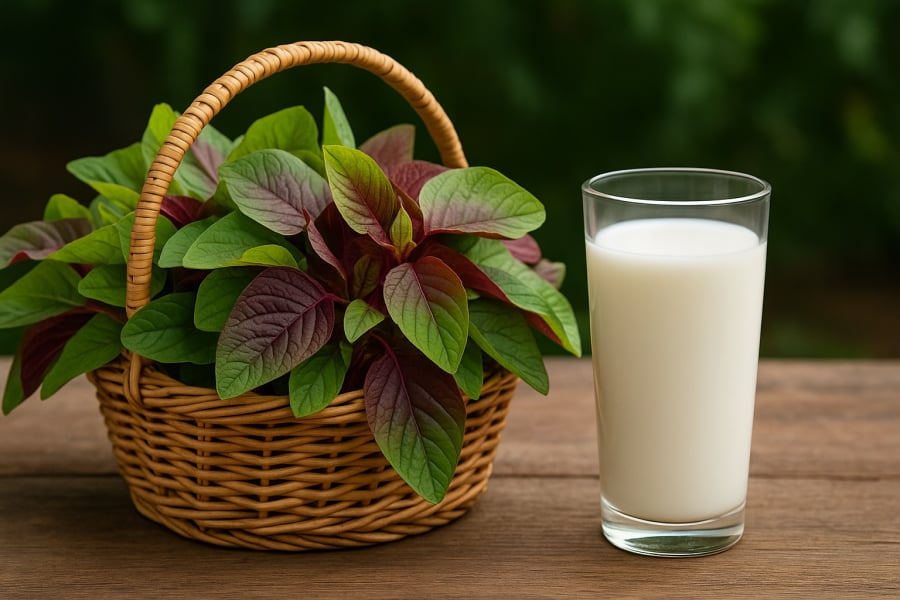Amaranth: The Unsung Calcium-rich Vegetable
Did you know that amaranth, a humble vegetable, packs a powerful punch when it comes to calcium content? With approximately 267mg of calcium in every 100g, it surpasses the amount found in fresh milk, which contains 125mg in the same quantity. What sets amaranth apart is the ease of calcium absorption, thanks to the natural combination of vitamin K and magnesium present in its leaves.
Not only is amaranth beneficial for bone health, but it also helps reduce the risk of osteoporosis in middle-aged women and the elderly—individuals who are more prone to calcium deficiency over time. This is particularly good news for those who are lactose intolerant or unable to consume dairy products. With amaranth, you can effectively boost your calcium intake through simple, everyday meals.
A Heart-healthy Choice: Lowering Cholesterol and Stabilizing Blood Pressure
The fiber in amaranth not only promotes a healthy digestive system but also plays a crucial role in reducing “bad” LDL cholesterol levels in the blood. Additionally, tocotrienol, a form of vitamin E found in this vegetable, has been proven to inhibit the formation of cholesterol, thereby supporting cardiovascular health.
Amaranth is also rich in potassium and magnesium, two essential minerals that work together to dilate blood vessels, regulate blood pressure, and improve blood circulation. For individuals aiming to manage their blood pressure or with a history of heart disease, amaranth presents a safe and wholesome option in their diet.

Blood Sugar Regulation and Weight Management
Amaranth has a low glycemic index and is packed with soluble fiber. This fiber slows down the absorption of glucose into the bloodstream, helping to maintain stable blood sugar levels after meals. For individuals following a weight loss regimen or managing type 2 diabetes, amaranth can be incorporated into daily meals.
Moreover, amaranth creates a prolonged feeling of fullness without spiking blood sugar levels, making it an excellent tool for portion control—an essential aspect of weight management and maintenance.
A Wealth of Antioxidants: Fighting Free Radicals and Cancer
Scientific research has revealed that amaranth is abundant in antioxidants such as anthocyanin, flavonoids, and phenolic acids. These compounds work to protect cells from the damaging effects of free radicals, which are implicated in premature aging and severe diseases, including cancer.
Extracts from amaranth have also been shown to inhibit the growth of certain cancer cells in laboratory conditions, particularly liver cancer. While it cannot replace medication, amaranth may serve as a natural shield, helping to ward off diseases through a healthy diet.
An Abundant Source of Iron and Vitamins: Boosting Hemoglobin and Enhancing Skin Health
Amaranth boasts another often-overlooked advantage: it is exceptionally rich in iron, an essential nutrient in blood formation. Every 100g of amaranth contains 5.4mg of iron, surpassing the levels found in some red meats. Combined with natural vitamin C, which enhances iron absorption, amaranth becomes an excellent blood-boosting food for women, who are more prone to iron deficiency due to physiological factors.
Additionally, amaranth contains vitamins A, C, and E, which are renowned for their skin-enhancing properties. For those seeking natural skincare solutions, amaranth is a wonderful gift from Mother Nature.

Consuming Amaranth the Right Way: Reaping the Benefits and Avoiding Potential Drawbacks
Despite its numerous advantages, there are a few considerations to keep in mind when incorporating amaranth into your diet:
- Cooling Properties: Amaranth has a cooling nature, so individuals with diarrhea or weak digestion should refrain from consuming excessive amounts.
- Oxalate Content: Amaranth contains high levels of oxalates, which can lead to kidney stone formation if consumed in large quantities, especially for those with a history of kidney stones.
- Avoid Reheating: Amaranth contains nitrates, which can transform into nitrites—which are not beneficial for health—if the vegetable is stored for extended periods or reheated multiple times.
- Avoid Combining with Calcium-rich Foods: Mixing amaranth with dairy products or other calcium-rich foods can lead to the formation of calcium oxalate precipitates, hindering absorption and potentially increasing the risk of kidney stones.
It is advisable to consume fresh amaranth, cooked just right, and preferably within the same day, without storing it overnight.
Conclusion
While many individuals spend a fortune on calcium supplements and anti-aging products, amaranth, a modest and affordable vegetable, offers an array of invaluable nutrients. From strengthening bones and safeguarding cardiovascular health to cancer prevention, amaranth deserves recognition as a “silent hero” on our dining tables.
Let us appreciate the simple pleasures that surround us—sometimes, the most ordinary ingredients, like a bunch of amaranth leaves prepared with a mother’s love, can bestow the greatest gifts for our well-being.
































